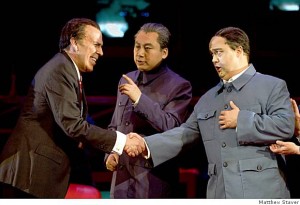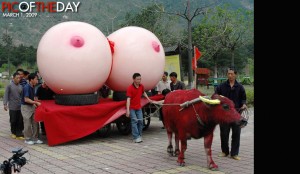I have to give this blog credit for their argument in favor of Obama’s pick to head the National Intelligence Council. Go look at their excerpted text of a leaked memo he wrote. I’ll just repeat a portion here, from a response he wrote in an exchange on China Security Listserv.
(2) The attack on “unarmed students” at Tian’anmen (actually at Muxudi and Fuxingmen and other locations outside Tian’anmen) came after many weeks, even months, in which the Chinese leadership had lost control of security in their own capital. (The troops were, in fact, fired upon at Muxudi, though it is not clear by whom.) The only surprise to me (and other realists, including, I gather, you) was that the Chinese leadership did not act earlier to restore order. We would have done so, judging by the precedents set by MacArthur and our National Guard over the decades from 1920 – 1950. The main lesson those leaders who survived the affair have drawn from it, in fact, is that one should strike hard and strike fast rather than tolerate escalating self-expression by exuberantly rebellious kids. If June 4 tells us anything about the Chinese leadership it is that they are reluctant, often to the point of rashness, to resort to the use of force against their fellow citizens.
(3) I am frankly stunned that you would argue that China has not “become more tolerant of dissent” in recent years. No one can have spent any time at all talking to ordinary people in China over the past two decades and have this view. Of course, outright opposition to rule by the Chinese Communist Party continues to draw a sharp response from the authorities. No government, including our own, is or should be asked to be prepared to tolerate efforts to overthrow it and the constitutional order it administers. (Ironically, despite our ideological predilections to believe the contrary, I am aware of no evidence that Chinese currently consider their government less “legitimate” or worthy of support than Americans do ours — but I defer to [name redacted by TWS] and other experts on this.) Certainly, China continues to fall far short of our minimal expectations for human and civil rights in many respects but it has made very significant progress on many levels. To deny this is primarily to raise questions about the extent to which one has been able to observe readily observable reality.
(4) You did not repeat the Rumsfeld / Rice canard that China has yet to make a decision whether to integrate itself into the existing order or to stand outside it. So you cannot be accused of embracing that quaint but hystrionic absurdity about a country that has joined just about every international organization and regulatory regime that exists, while emerging as a strong defender of the status quo in each against attacks on them, primarily from the US.
Like you, I worry that we will get China fundamentally wrong. It is certiain that we will do so if we allow our idées fixes and ideological preconceptions to guide our reasoning about China rather than deriving our conclusions from first-hand and empirically validatable data.
There’s a lot of stuff there. I can take issue with this or that, but I like the way he challenges the dominant paradigm and his willingness to question sacred cows. I also like that he strives to see the good along with the bad, in extreme contrast to the Bush people who would see Hamas and Hezbollah, for example, only as terrorist groups without understanding how they are perceived by the people who elected them and the role they play in those people’s lives. (Note that I am not saying they aren’t supporters of terrorism, only that it’s a bit more complex than that.)
I know the Tiananmen Square item will create a lot of hysteria. But it’s important you look at what Freeman actually said. I can hear the emotional outcry already: “Freeman is in favor of shooting unarmed students in the back!” But look at his words and put your emotions to the side for a moment. He was surprised the government “didn’t act earlier” – which is not to say he wondered why they didn’t start killing students earlier. The way the CCP handled it was clumsy and ultimately catastrophic, allowing the chaos to drag on for months and suddenly crushing it in a way that haunts them to this day. Of course they should have acted earlier and struck hard –to keep the country functional and to avoid a bloodbath.
To “strike hard and strike fast” does not mean to murder. I think its pretty clear Freeman means it in the sense of nipping the escalating crisis at its earliest stages, maybe with more meaningful negotiations and stronger insistence that bringing the capital city to its knees was not the most productive way to effect change. Personally, my pragmatic side wishes they’d used tear gas at an earlier stage to clear the square, while my idealistic side wishes they’d struck hard and fast by thanking the students for raising serious issues, and inviting them to work with them to change things. But the worst strategy was the dithering for months, which led to breakdowns that made the massacre all but inevitable.
Unfortunately the way Freeman worded it, with the words “strike hard and fast,” will no doubt leave him open to unfair criticism. Kennedy struck hard and fast during the Cuban Missile Crisis. If Freeman had said “respond quickly and emphatically” he’d be a lot better off. We Americans can get quite bent out of shape from out-of-context and misinterpreted remarks, which can damn a politician forever. We have to remember this was a note on China Listserv, not a formal policy statement.
To repeat what I’ve said so many times here: I admire what the students, for all their faults and, in some instances self-interest, achieved in 1989. June 4 is a dark cloud over China that will not go away. The government’s approach was horrific, no matter who fired the first shots (and I know all sides of the story and have seen the photos of the soldiers’ bodies on fire). I still get emotional when I think about this image, and I still remember the hope and the thrill I felt watching what seemed like a miracle unfold in the early days of the demonstrations. But it’s not nearly so simple as good versus evil. It never is.
There is too much dynamite-laced content in the memo to go through it line by line; each item could ignite an endless thread of disagreement. And as I said, I don’t agree with all of it. But I like the way Freeman seeks to clear away the clutter of fixed notions, stereotypes and myths, and I admire his willingness to put his neck on the line to challenge conventional thinking and then to back it up with an intelligent argument.
But don’t just take my word for it. Please go and read what the smartest journalist in China has to say about Freeman.
…I don’t know Freeman personally. I don’t know whether the Saudi funding for his organization has been entirely seemly (like that for most Presidential libraries), which is now the subject of inspector-general investigation. If there’s a problem there, there’s a problem.
But I do know something about the role of contrarians in organizational life. I have hired such people, have worked alongside them, have often been annoyed at them, but ultimately have viewed them as indispensable. Sometimes the annoying people, who will occasionally say “irresponsible” things, are the only ones who will point out problems that everyone else is trying to ignore. A president needs as many such inconvenient boat-rockers as he can find — as long as they’re not in the main operational jobs. Seriously: anyone who has worked in an organization knows how hard it is, but how vital, to find intelligent people who genuinely are willing to say inconvenient things even when everyone around them is getting impatient or annoyed. The truth is, you don’t like them when they do that. You may not like them much at all. But without them, you’re cooked.
So to the extent this argument is shaping up as a banishment of Freeman for rash or unorthodox views, I instinctively take Freeman’s side — even when I disagree with him on specifics. This job calls for originality, and originality brings risks. Chas Freeman is not going to have his finger on any button. He is going to help raise all the questions that the person with his finger on the button should be aware of.
The Bush administration suffered from a dearth of boat-rockers. Those who disagreed were shunted and silenced, labeled as “disloyal.” I’m impressed that Obama chose Freeman for this position, irrespective of whether I disagree with him on all topics related to China. Or the Middle East. He seems to have the kind of mind we need more of, and I hope he survives the inevitable firestorm these seemingly provocative – but actually rather down-to-earth – remarks will generate.
Update: Please be sure to see the new post I wrote about Freeman following his exit from the nomination. So much hoopla over remarks that, when looked at carefully, were well intended, non-provocative and intelligent. Such a loss for America.


Comments